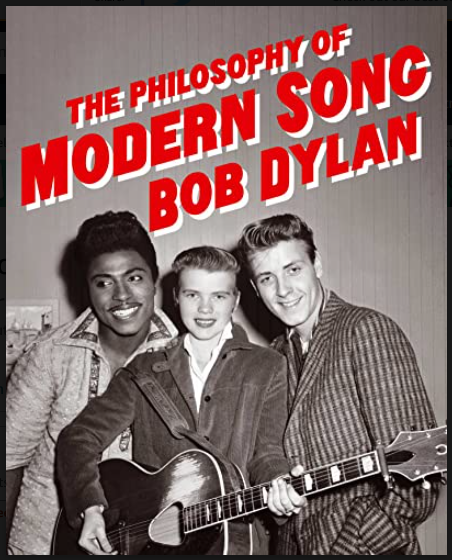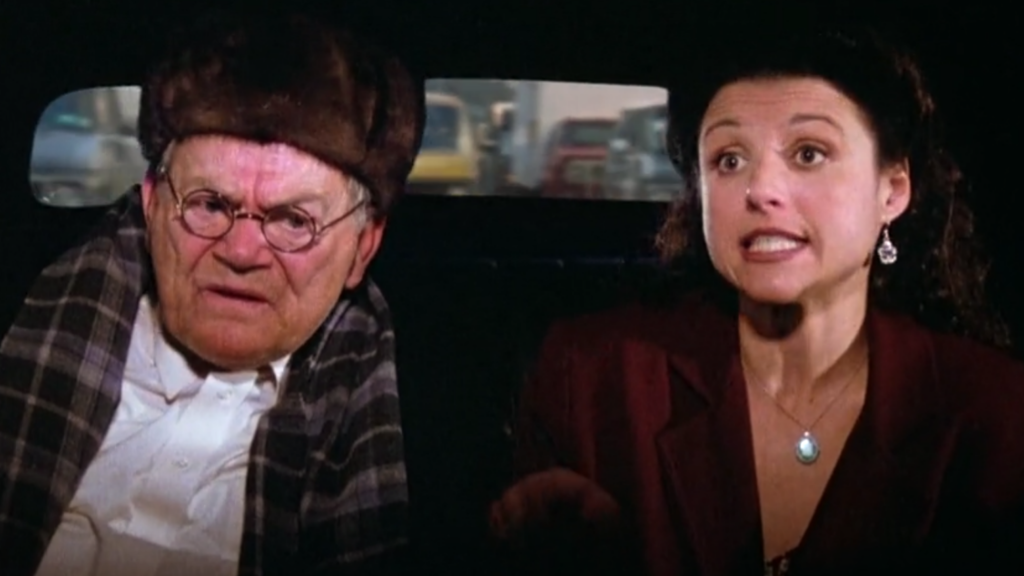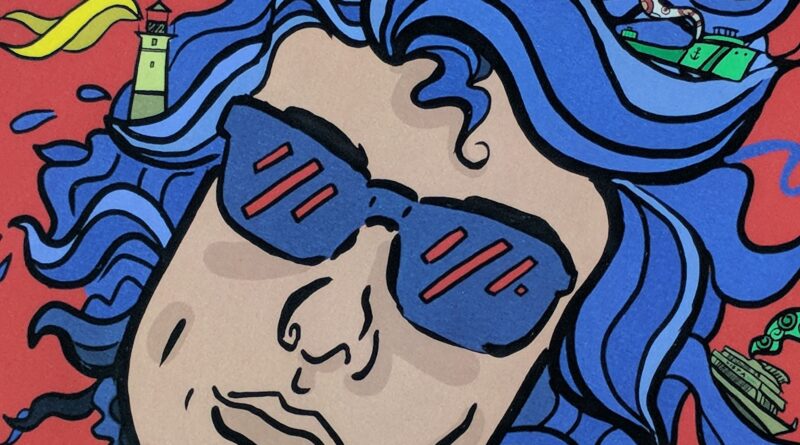Bite-sized Bob: Dylan shares 66 of his favorite songs
THE PHILOSOPHY OF MODERN SONG
By Bob Dylan
Simon & Schuster, $45 list; or $22.50 at Target and on Amazon at review date.
The new Bob Dylan book looks great and smells better. The tremendous design incorporates so many groovy photos and illustrations that you could just skip the words. The visual feast begins with the awesome cover shot of Little Richard and Eddie Cochran flanking the guitar-wielding “female Elvis,” a.k.a. Alis Lesley. It was taken while they were touring Australia in 1959, a trek that was cut short when Little Richard found Jesus, an affliction that Dylan will relate to.

Another cool thing about the grandly titled The Philosophy of Modern Song is the short chapters, about five pages each including pictures. And you don’t have to read them in any order. Just open the book randomly and savor the surprise. (This was how I did my book, by the way, Strange Days: The Adventures of a Grumpy Rock ‘n’ Roll Journalist in Los Angeles, in the belief that readers should be empowered to pick and choose what they want to read. You’re welcome.)
While mine was two-dozen chapters on two-dozen musicians, Bob’s is a serious listicle: sixty-six chapters on sixty-six songs, as in Route 66. It can’t be a coincidence. Dylan is taking us on a wild cross-country trip in his Buick Six. As the engine purrs, we enjoy his fast-paced sales patter, even if we’re not quite sure what he’s selling much of the time.
I’m familiar with most of the artists, but only about half of the songs, which is feeble for a music guy. But Bob has given me a hefty homework assignment and I’m going to ace it. (I’ll give the Grateful Dead a wide pass, however.) I’m ready to have my life changed by Uncle Dave Macon’s 1924 single “Keep My Skillet Good and Greasy” — a “blast furnace of a song” that’s “Chuck Berry years before Chuck first duck-walked.”
And everyone knows Perry Como, who is cited here for “Without a Song.” But I didn’t know that he was best defined by what he is not. According to Dylan, he’s “the anti-Rat Pack, the anti-American idol, anti-flavor of the week, anti-hot list, anti-bling.” Now I’m going to have to fork out for a big boxed set.
Did you know that two songs featured on Seinfeld passed Dylan’s test? Edwin Starr’s version of “War” and the Eagles’ “Witchy Woman.” As we learned from the show, the phrase “war, what is it good for?” was Tolstoy’s original title for War and Peace; and Elaine adopts “Witchy Woman” — or is it Wit-chay Woman? — as her song after her boyfriend refuses to share “Desperado” with her. There’s a third song with a Seinfeld connection: Bobby Darin’s cover of “Mack the Knife.” Jerry coos “Mackie’s back in town” when Kramer shows up at the coffee shop in a shiny new suit courtesy of his Japanese friends.

By the way, Dylan denies Starr’s declaration that war is good for “absolutely nothing,” reducing his own seething peacenik song “Masters of War” to a pile of rubble in the process. He notes that war is often the only solution when talks have broken down; it frees people from oppression and slavery (something that Motown’s fact-checkers should have been aware of); boosts trade (but see “Sundown on the Union”) and opens channels of communication. But he harbors no ill will towards the song’s architect’s, Norman Whitfield and Barrett Strong, since they also gave us the Temptations’ “Ball of Confusion (That’s What the World is Today)” which Dylan can’t glorify enough, although he did omit the parenthetical bit.
A handful of other acts get dual listings, including Elvis Presley and Johnny Cash (their Sun labelmate Carl Perkins also makes the cut, which leaves Jerry Lee Lewis out in the cold). Dylan remains dismissive, however, of the “august solemnity” of Cash’s murder ballads, hardscrabble tales and Trent Reznor covers [sic]. Go instead, Dylan advises, to “Big River” — Johnny’s theme song; and don’t take your guns to town either.
There are a couple of low blows. Dylan’s adulation of blues harpist Little Walter requires him to trash everyone else at Chess Records. “Out of all the artists on Chess, he [Little Walter] might have been the only one with real substance.” Sure, Jack.
It’s a zero-sum game when it comes to crowning “one of the greatest singers ever.” Dylan opts for Tony Williams of the Platters (“My Prayer”) and Sam Cooke can go to hell: “You couldn’t picture this guy [Williams] getting shot, bare naked in a hotel room.”
Dylan’s claim that Dean Martin died “broken, sad and alone . . . in a restaurant off the Sunset Strip” indicates he might have been drinking too much of his own whisky.
He writes that British people have “dignity and pride,” but not many of them made the cut. The Peters Townshend & Green are the only two songwriters from the ‘60s, for “My Generation” and “Black Magic Woman,” respectively; Joe Strummer and Mick Jones get a nod for “London Calling,” though it seems Dylan wrongly interpreted the phrase “phony Beatlemania.” Son Jakob should have caught that one. Elvis Costello was surely pumped that Dylan included “Pump It Up,” but hopefully wasn’t too bummed to learn that he “went all over the place” and “exhausted people.”
One wonders if Dylan had a devilish twinkle in his eye — or was simply out of his mind — when he suggested that “bluegrass is the other side of heavy metal,” that “Volare” was possibly one of the first hallucinogenic songs, and that “El Paso” is “a song of genocide.” Maybe he’s looking for a fight. Who’d want to go up against him, though? The Bard of Hibbing knows everything (that rhymes!) and it will be a bloody first-round knockout.
NOTE: If you liked this review, try my gossipy rock bio Strange Days: The Adventures of a Grumpy Rock ‘n’ Roll Journalist in Los Angeles, available here. For more info, go to strangedaysbook.com
